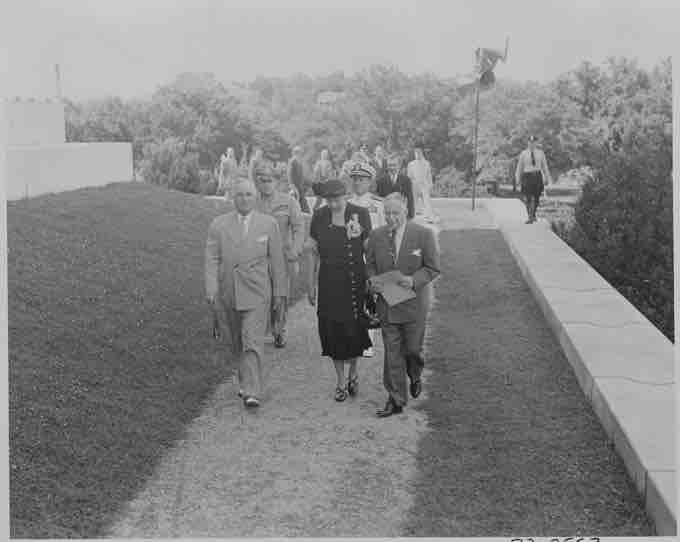Civil Rights under the Truman Administration
During his administration, Truman made several important contributions to the Civil Rights Movement. First, he created the President's Committee on Civil Rights by Executive Order 9808 on December 5, 1946. The committee was instructed to investigate the status of civil rights in the country and propose measures to strengthen and protect them. After the committee submitted a report of its findings to President Truman, it disbanded in December 1947.
The committee produced a report titled To Secure These Rights, which presented a detailed ten-point agenda of civil rights reforms. In February 1948, the president submitted a civil rights agenda to Congress that proposed creating several federal offices devoted to issues such as voting rights and fair employment practices. This provoked a storm of criticism from Southern Democrats in the runup to the national nominating convention, but Truman refused to compromise, saying: "My forebears were Confederates ... but my very stomach turned over when I had learned that Negro soldiers, just back from overseas, were being dumped out of Army trucks in Mississippi and beaten."
Tales of the abuse, violence, and persecution suffered by many African American veterans upon their return from World War II infuriated Truman, and were a major factor in his decision to issue Executive Order 9981, in July 1948, desegregating and requiring equal opportunity in the Armed Forces. After several years of planning, recommendations and revisions between Truman, the Committee on Equality of Treatment and Opportunity and the various branches of the military, Army units became racially integrated.
Another executive order, also in 1948, made it illegal to discriminate against persons applying for civil service positions based on race. A third, in 1951, established the Committee on Government Contract Compliance (CGCC). This committee ensured that defense contractors did not discriminate because of race.

President Truman addresses the NAACP
President Truman addresses the closing session of the 38th annual conference of the National Association for the Advancement of Colored People at Lincoln Memorial in Washington, D.C. (1947)
Truman's Impact on Civil Rights
Truman's efforts, including the President's Committee on Civil Rights, were important for the burgeoning issue of racism in post-war America. Protection from lynching and desegregation in the work force was a triumph of conscience for Truman, as he recalled in his farewell address:
There has been a tremendous awakening of the American conscience on the great issues of civil rights--equal economic opportunities, equal rights of citizenship, and equal educational opportunities for all our people, whatever their race or religion or status of birth.
These "small actions" culminated into the signing of the two executive orders mentioned above by Truman in 1948, an election year. In light of the growing possibility of war, addressing the state of black morale the armed forces was particularly important. The far-reaching effects that the committee had hoped for had little impact on the civil rights of Black Americans in the late 1940s. Historian Howard Zinn argued that the President failed to use the power given to him by the 14th and 15th amendments to execute laws strong enough to combat discrimination. It was not until the Brown vs. Board of Education decision that the separate but equal doctrine would be overturned and segregation would be officially outlawed by the U.S. government.
Other Civil Rights Issues After WWII
Housing segregation was a nationwide problem, persistent well outside the South. Although the federal government had become increasingly involved in mortgage lending and development in the 1930s and 1940s, it did not reject the use of race-restrictive covenants until 1950. Suburbanization was already connected with white flight by this time, a situation perpetuated by real estate agents' continuing discrimination. In particular, from the 1930s to the 1960s the National Association of Real Estate Boards (NAREB) issued guidelines that specified that a realtor
should never be instrumental in introducing to a neighborhood a character or property or occupancy, members of any race or nationality, or any individual whose presence will be clearly detrimental to property values in a neighborhood.
Invigorated by the victory of Brown and frustrated by the lack of immediate practical effect, private citizens increasingly rejected gradualist, legalistic approaches as the primary tool to bring about desegregation. They were faced with "massive resistance" in the South by proponents of racial segregation and voter suppression. In defiance, African-American activists adopted a combined strategy of direct action, nonviolence, nonviolent resistance, and many events described as civil disobedience, giving rise to the African-American Civil Rights Movement of 1954–1968.
Jackie Robinson
Jackie Robinson (January 31, 1919 – October 24, 1972) was an American Major League Baseball second baseman who became the first African American to play in the major leagues in the modern era. Robinson broke the baseball color line when the Brooklyn Dodgers started him at first base on April 15, 1947. The Dodgers, by playing Robinson, heralded the end of racial segregation that had relegated black players to the Negro leagues since the 1880s. Robinson was inducted into the Baseball Hall of Fame in 1962.
Robinson's character, his use of nonviolence, and his unquestionable talent challenged the traditional basis of segregation which then marked many other aspects of American life. He had an impact on the culture of and contributed significantly to the Civil Rights Movement. Robinson also was the first black television analyst in MLB, and the first black vice president of a major American corporation, Chock full o'Nuts. In the 1960s, he helped establish the Freedom National Bank, an African-American-owned financial institution based in Harlem, New York. In recognition of his achievements on and off the field, Robinson was posthumously awarded the Congressional Gold Medal and Presidential Medal of Freedom.
Jackie Robinson, 1954
Jackie Robinson of the Brooklyn Dodgers, posed and ready to swing